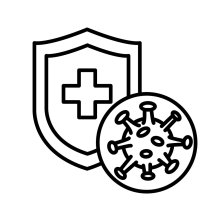

Infection and immunity research theme
Understanding microbes, host immunity and preventing the spread of infectious disease.
The challenge
Biosecurity is a global concern — infectious disease is estimated to cause a third of all human deaths worldwide. Better ways to empower the immune system to protect us from pathogens, but without triggering the inappropriate immune responses that cause illness, are continually needed. As microbes evolve and emerge from animal reservoirs to threaten our food supply and health, we need to develop new agents such as vaccines and antimicrobials and also understand how best to use them, including to avoid antimicrobial resistance.
Our response
Within the theme we take an interdisciplinary and one health approach to tackling these challenges. Investigations of host-pathogen interactions and of microbial structure and mechanisms, including at the quantum level, reveal target structures and pathways for blocking transmissible disease and enhancing antimicrobial penetration in humans and animals. Studies to elucidate immune system complexities inform better diagnosis and treatment of autoimmunity, inflammation and sepsis. Generating new data sets and applying computational techniques enables new ways to minimise the transmission of pathogens and to optimise antibiotic production from bacterial strains to be designed.
Research projects
Active projects
Completed projects
Start date: January 2020
End date: January 2023
Timing, quality, and physiology of sleep in a deprived community cohort in South Africa, and their relationship with chronic disease
Start date:
End date:
Start date:
End date:
Researchers
Research theme lead

Dr Matteo Barberis
Faculty Theme Leader for Infection and Immunity, Faculty Coordinator of Centre for Mathematical and Computational Biology (CMCB), and Reader in Systems Biology
Biography
Matteo started to work on cell cycle control during his master thesis and early PhD in the laboratory of Lilia Alberghina at the University of Milano-Bicocca (Italy), where he was interested to investigate biochemical mechanisms through which cellular activators and inhibitors regulate biochemically the onset into DNA replication in budding yeast. He then moved to the Max Planck Institute for Molecular Genetics in Berlin (Germany), in the laboratory of Edda Klipp, to complete his PhD and translate his experimental research into computational modeling through generation of mathematical models of the eukaryotic cell cycle. He then did a six year Postdoc at both the Max Planck Institute for Molecular Genetics and the Humboldt University in Berlin with Edda Klipp, where he developed as a systems biologist by integrating computational modeling and experimental strategies to uncover novel molecular mechanisms driving a timely cell cycle. In 2013, he then started his independent group as Assistant Professor of Synthetic and Systems Biology at the University of Amsterdam (The Netherlands), where he expanded his investigations to explore how molecular switches drive gene regulation dynamics in cell cycle control and in immune responses, such as those governed by T and mast cells. In December 2018, he joined the University of Surrey as Reader in Systems Biology, with the aim to unravel design principles of cellular organization, and develop multi-scale frameworks to understand how properties of biochemical systems emerge from the integration of multiple regulatory layers. His multi-faceted interests also expands to build cellular maps for network-based drug design, with a particular emphasis on cell physiology and disease.
Altogether, Matteo aims to unravel design principles of cellular organization by integrating computational modeling and molecular biology, in order to predict, test and validate experimentally molecular mechanisms underlying emergent properties of biological systems. He uses yeast and mammalian cells to investigate how dynamics switches timely control the eukaryotic cell division cycle. Furthermore, Matteo is also interested to develop multi-scale frameworks and tools to understand how properties of biological systems emerge from the integration of multiple layers of cellular regulation.

Neglected tropical diseases research
At Surrey work on a range of bacterial, viral and parasitic neglected tropical diseases including Buruli ulcer, intestinal worms and rabies, schistosomiasis and echinococcosis.


